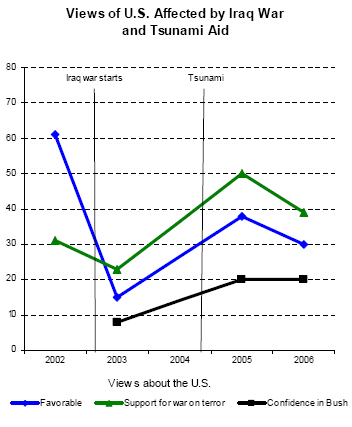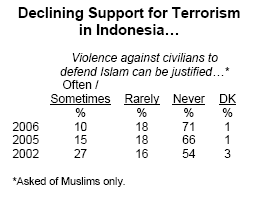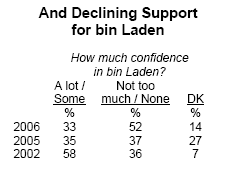by Richard Wike
In Indonesia, where President Bush travels early next week after attending the Asia-Pacific Economic Cooperation (APEC) summit in Vietnam, America’s image has undergone some dramatic ups and downs over the last few years. As in much of the world — and especially in Muslim countries — hostility toward the U.S. skyrocketed among Indonesians following the invasion of Iraq in 2003. But America’s image rebounded when a horrific tsunami hit Indonesia in December of the following year and the U.S. stepped in with considerable public and private aid. That act of generosity provided greatly needed assistance to victims of the disaster, and ultimately helped resuscitate America’s popularity somewhat in the world’s largest Muslim country.
 In 2002, the Pew Global Attitudes survey found that six-in-ten Indonesians (61%) held a favorable view of the United States. A year later, following the U.S. invasion of Iraq, only 15% of Indonesians had a positive opinion, a dramatic 46-point plunge.
In 2002, the Pew Global Attitudes survey found that six-in-ten Indonesians (61%) held a favorable view of the United States. A year later, following the U.S. invasion of Iraq, only 15% of Indonesians had a positive opinion, a dramatic 46-point plunge.
When Pew next surveyed Indonesia in 2005, however, America’s favorable rating had more than doubled to 38%, an increase due in large part to the aid provided by the U.S. after the December 2004 tsunami that killed an estimated 167,000 in Indonesia. Indeed, 79% of Indonesians said that the aid led them to have a more positive view of the U.S. A year later, the 2006 survey shows a slight decline in evaluations of the U.S., although at 30%, America’s favorable rating is still significantly higher than it was in 2003.
Of course, the impact of this humanitarian assistance should not be overstated — some of the same misgivings about the U.S. seen throughout the Muslim world can be found in Indonesia, and most Indonesians (67% in 2006) continue to have a negative impression of the U.S.
Other attitudes about the U.S. exhibit a similar pattern — a nadir around the beginning of the Iraq war, followed by an increase after the tsunami, and a leveling off or slight decline in 2006. For instance, after the tsunami, Indonesians were less likely to believe the U.S. acts only out of self-interest in world affairs. In 2002, 41% said the U.S. takes into account the interests of countries like Indonesia when making foreign policy decisions, but in 2003 this figure dropped to 25%. By 2005 however, a solid majority (59%) said the U.S. considers the interests of countries like theirs. This question was not, however, asked in 2006 so it is not known if it would have paralleled the decline seen in the other indicators.
Opinion of President Bush also improved following the tsunami aid, although he remains largely unpopular. Whereas in 2003 only 8% had a lot or some confidence in Bush to do the right thing in world affairs, in 2005 and 2006, one-in-five (20%) proclaimed confidence in Bush. Even this low level of support makes Indonesia the most pro-Bush Muslim population included in the 2006 survey, including Muslim populations in Britain, France, Germany, and Spain.
 Support for U.S.-led efforts to fight terrorism also spiked after the tsunami, rising from 23% in 2003 to 50% in 2005, before sliding to 39% in 2006. Of course, Indonesia has had its own direct experiences with terrorism in recent years, suffering devastating bombings by Islamic extremists in Bali in 2002 and 2005 and in Jakarta in 2003 and 2004. Over this time period, support for terrorism among Indonesians has declined sharply.
Support for U.S.-led efforts to fight terrorism also spiked after the tsunami, rising from 23% in 2003 to 50% in 2005, before sliding to 39% in 2006. Of course, Indonesia has had its own direct experiences with terrorism in recent years, suffering devastating bombings by Islamic extremists in Bali in 2002 and 2005 and in Jakarta in 2003 and 2004. Over this time period, support for terrorism among Indonesians has declined sharply.
In 2002, more than a quarter of Indonesians said suicide bombing and other forms of violence against civilian targets in order to defend Islam from its enemies can often or sometimes be justified, while another 16% said such attacks can be justified on rare occasions. Just over half felt that this type of violence can never be justified.
 By 2006, after several years of terrorist violence in Indonesia, support for terrorism had dropped significantly — only 10% now say violence against civilians can often or sometimes be justified, and seven-in-ten (71%) reject such acts completely.
By 2006, after several years of terrorist violence in Indonesia, support for terrorism had dropped significantly — only 10% now say violence against civilians can often or sometimes be justified, and seven-in-ten (71%) reject such acts completely.
Similarly, support for Osama bin Laden has also declined. While a troublingly high number of Indonesians still have either a lot or some confidence in bin Laden to do the right thing in world affairs — 33% — his level of support is considerably lower now than in 2002, when nearly six-in-ten Indonesians said they had confidence in the al Qaeda leader.


